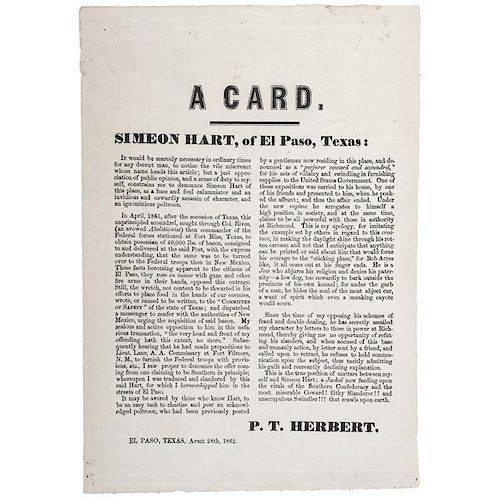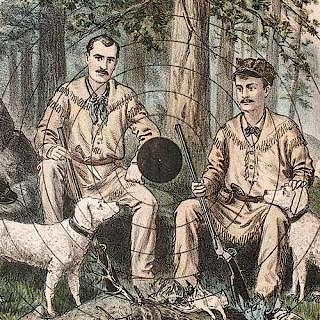Early Texas Broadside Mentioning Simeon Hart, 1862
About Seller
6270 Este Ave.
Cincinnati , OH 45232
United States
With offices in Cincinnati, Cleveland and Denver, Cowan’s holds over 40 auctions each year, with annual sales exceeding $16M. We reach buyers around the globe, and take pride in our reputation for integrity, customer service and great results. A full-service house, Cowan’s Auctions specializes in Am...Read more
Two ways to bid:
- Leave a max absentee bid and the platform will bid on your behalf up to your maximum bid during the live auction.
- Bid live during the auction and your bids will be submitted real-time to the auctioneer.
Bid Increments
| Price | Bid Increment |
|---|---|
| $0 | $25 |
| $500 | $50 |
| $1,000 | $100 |
| $2,000 | $250 |
| $5,000 | $500 |
| $10,000 | $1,000 |
| $20,000 | $2,500 |
| $50,000 | $5,000 |
| $100,000 | $10,000 |
About Auction
Nov 20, 2015 - Nov 21, 2015
Cowan's Auctions dawnie@cowans.com
- Lot Description
Early Texas Broadside Mentioning Simeon Hart, 1862
Printed broadside, 8.5 x 12.25 in., berating a local merchant, Simeon Hart, for selling bacon to the enemy. After the 1861 secession of Texas, the ignominious poltroon reportedly obtained 49,000 lbs. of bacon meant for U.S. Federal Troops in New Mexico. Outraged citizens, rose en masse with guns and other fire arms, and demanded the bacon not be delivered to the enemy. Hart ignored his fellow Texans and completed the nefarious transaction, which impelled Herbert to write the scathing article. Produced by P.T. Herbert of El Paso, TX, 1862. Framed, 13 x 17 in. A typed inscription on the mat reads, From the personal papers of the Honorable Alexander Stephens, but this provenance cannot be confirmed.
Simeon Hart (1816-1874) was one of the most successful flour merchants and the wealthiest citizen of El Paso due to his lucrative contracts with the military. Contrary to his decision to sell the bacon to Union soldiers, he was a staunch secessionist and pro-Southerner. He was a part of a land slide group that voted in favor of Texas leaving the Union. Only two votes lobbied against the decision. After the vote Hart shouted when one of his many enemies, anti-secessionist, W.W. Mills, entered the saloon, "Champagne for the secessionists and the noose for all Unionists!" W.W. Mills sought revenge on Herbert and attempted to cease all of his assets. Herbert's other enemy, Philemon T. Herbert, also had a very dangerous temper and taste for revenge.
Philemon T. Herbert (1825–1864), the author of the broadside, was an active politician and "Southern Gentleman" with a checkered past. In 1845 he left his home state of Alabama for Texas after the University of Alabama suspended him for stabbing a student. Five years later he moved to California and became its senator. He had to abandon his political career after he shot and killed an Irish waiter in a D.C. hotel. Ruined, he retreated back to Texas to mine and practice law. He reentered politics and served as a delegate at the Secession Convention. When the war began he enlisted as a lieutenant colonel in the Confederate Army. He died in the battle of Mansfield.Appears to be some remnants of the folds on the papers. It cannot be determined if the broadside is glued to the mat.Condition
- Shipping Info
-
SHIPPING. At the request of the buyer, Cowan's will authorize the shipment of purchased items. Shipments usually occur within two weeks after payment has been received. Shipment is generally made via UPS Ground service. Unless buyer gives special instructions, the shipping method shall be at the sole discretion of Cowan's Auctions, Inc.. Cowan's is in no way responsible for the acts or omissions of independent handlers, packers or shippers of purchased items or for any loss, damage or delay from the packing or shipping of any property.
-
- Buyer's Premium



 EUR
EUR CAD
CAD AUD
AUD GBP
GBP MXN
MXN HKD
HKD CNY
CNY MYR
MYR SEK
SEK SGD
SGD CHF
CHF THB
THB











